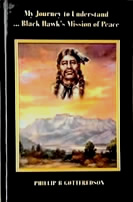STATEMENT, M. S.
MARTENAS, INTERPRETER
Great Salt Lake City, July 6 1853
Brigham Young Papers, MS 1234, Box 58, Folder 14
LDS Archives
File: Martenas-Walker Statement
Statement, M. S. Martenas, Interpreter, Great Salt Lake
City, July 6 1853, Brigham Young Papers, MS 1234, Box 58,
Folder 14, LDS Archives.
Will Bagley Transcription
At the request of Maj. [Jacob] Holeman Ind. Agent for U.
Ter. I held a conversation with Indian Chief Walker (Wakara)
respecting his feelings and wishes relative to the whites
setling [sic] on this lands, and on the lands of the Indians
generally.
He said that he had always been opposed to the whites
set[t]ling on the Indian lands, particularly that portion
which he claims; and on which his band resides and on which
they have resided since his childhood, when they first commenced the
settlement of Salt Lake Valley, was friendly, and promised
them many comforts, and lasting friendship—that they
continued friendly for a short time, until they became
strong in numbers, then their conduct and treatment towards
the Indians changed—they were not only treated unkindly, but
many were much abused and this course has been pursued up to
the present—sometimes they have been treated with much
severity—they have been driven by this population from place
to place—settlements have been made on all their hunting
grounds in the valleys, and the graves of their fathers have
been torn up by the whites. He said he wished to keep the
valley of the San Pete, and desired to leave the valley of
Salt Lake, as he could not live in peace with the whites—but
that the Whites had taken possession of this valley also—and
the Indians were forced to leave their homes, or submit to
the constant abuse of the whites. He said the Gosoke
who formerly lived in the Salt Lake valley had been killed
and driven away, and that now they wished to drive him and
his band away also—he said he had always wished to be
friendly with the whites—but they seemed never to be
satisfied—the Indians had moved time after time, and yet
they could have no peace—that his heart was sick—that his
heart felt very bad. He desired me very earnestly to
communicate the situation of the Indians in this
neighborhood to the Great Father, and ask his protection and
friendship—that whatever the great father wished he would
do. He said he has always been opposed to the whites
settling on his lands, but the whites were strong and he was
weak, and he could not help it—that if his great father did
not do something to relieve them, he could not tell what
they would do.
I have had sincere talks with Sou-we-reats, (the man that
picks fish from the water) Toe-kah-boo (Black belly) who
have always expressed themselves in the strongest terms
against the whites setling [sic] on their lands. Sow-we-reats
in Uwinty Valley and [2] Too ke boos, on the river of the
same name—it is a fine valley, well watered, and has plenty
of game. These Indians and their ancestors have long
occupied this country—they very much dislike to leave
it—they say they cannot live with the whites, for they
cannot live in peace—the whites want every thing, and will
give the Indians nothing—that they shoot the Indians if they
walk over their grounds.
I have been acquainted with his country, and these Indians
for upwards of thirty years. I have known Walker, Sou wah
reats, and Tookeboos since they were children—I have always
been on friendly terms with them—they talk freely with
me—and express their feelings and wishes without reserve.
One prominent cause of the present excitement is the
interference of the Mormons with their long established
Spanish trade, and the killing of an Indian trader by the
name of Bowman, from Santa Fee, and charging the murder to
the Indians. I greatly fear that much difficulty will grow
out of the present excited condition of the Indians,—should
the Mormons continue their unkind treatment. I have just had
a long conversation with the Chief Walker and make the above
statement of his feelings with his expressions fresh in my
mind.
Great Salt Lake City July 6 1853 M. S. Martenas, Interpreter [1]
1 Martinez was a common name in New
Mexico. In his sketch of the life of Denis Julien, Otis
“Doc” Martin noted Manuel Martinez’ 1827 report of a party
sent “to retrieve some caches in the direction of the lands
of the Utes.” See LeRoy R. Hafen, ed., The Mountain Men and
the Fur Trade of the Far West, 10 vols. (Glendale,
California: The Arthur H. Clark Company, 1965-1972), 7:185.
Bancroft mentioned a Miguel Martinez at San Bernardino in
1846. I have been unable to make a more precise
identification.
Note: I wish to express my gratitude to my friend Will Bagely for sharing this document with me and the many hours we spent discussing the Black Hawk War in Utah.
It will be noted that I also spent considerable time with the direct descendants of Chief Walker of the Timpanogos Nation and the direct descendants of Chief Walker. Chief Walker's Tribal name was Yah-kera, spelled phonetically, according to Bancroft and other documents written prior to Mormon settlement in 1847. His living descendants prefer Wakara. Same person, different spellings of the name. The name “Walker” came about when Wakara was allegedly baptized into the Mormon faith by Bishop Walker. - Phillip B Gottfredson
Next: Tintic War
